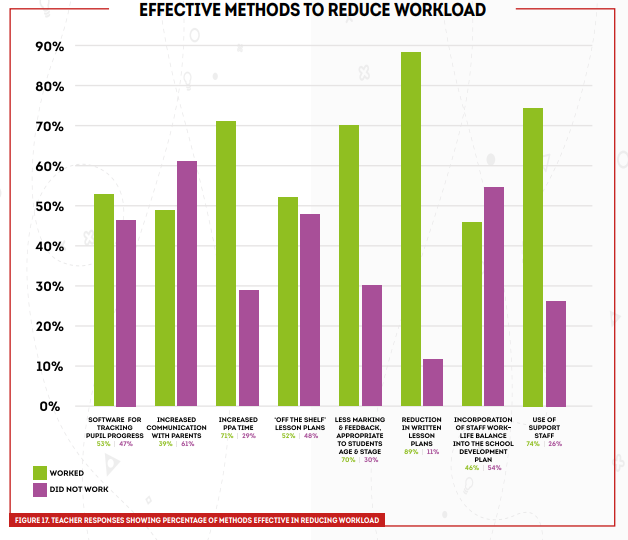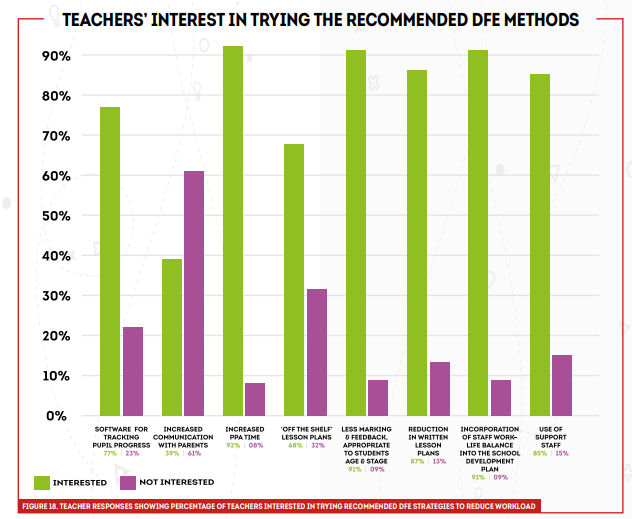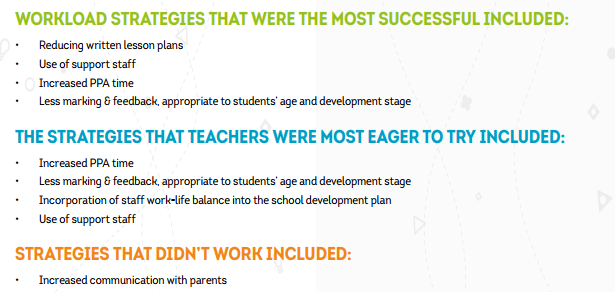We are currently in the midst of one of the worst teacher shortages we’ve ever seen. Cuts to funding and an upsurge in teacher workload have left many questioning their place in the profession. In addition to the increase in planning, marking and feedback – let alone taking classes, teachers are increasingly having to prove their worth, with added pressures coming from both the Government as well as school Senior Leadership Teams.
In 2016, the DfE tried to relieve teacher workloads by creating The Workload Challenge – a survey asking teachers to share their experiences, ideas and solutions on how to tackle unnecessary and unproductive workloads. A year on, a survey conducted by Groupcall asked teachers about both their thoughts on these suggested methods and whether they had succeeded in helping teachers cut down their workload.

Workload challenge recommendation #1: Reduction in written lesson plans
Lesson planning is considered by many to be at the heart of effective teaching. It is an area where teachers can use their passion to make a difference in their students’ education.
Although there are many benefits of writing up lesson plans to be fully prepared, of the teachers surveyed in Groupcall’s report:
- 87% agreed they would be interested in reducing the quantity of written lesson plans.
- 55% had tried to lower the amount of written lesson plans and found it helped to reduce their workload.
- A further 33% said that they hadn’t tried this method, but would be willing to try it in their school.
Of those surveyed, teachers said that creating shorter lesson plans helped them focus on key information that needed to be taught and allowed them to be more flexible in the teaching methods used.
Some teachers, however, swear by keeping written lesson plans which resulted in just under 5% of teachers saying this method would not work in their school and that other strategies would be more effective.
Groupcall Top Tip: Encourage five-minute lesson plans with all the key components. Within these plans make sure the big picture, objectives and how students should be engaged are detailed. This should aim to be fitted onto one postcard sized piece of paper, with four key learning episodes and whether the lesson will be teacher or peer assessed.
Workload challenge recommendation #2: less time spent on marking and feedback
Written feedback and marking can be the bane of teachers’ lives, with 91% saying that less time should be spent on it. The 25% who tried reducing breadth of detail given in marking feedback found that it did help to minimise their workload.
Effective marking is, however, an essential part of the education process. Teacher and pupil interaction is imperative to a successful education as teachers must acknowledge pupils’ work, check progress and decide on next steps. This can often be achieved without detailed written commentary. Teachers know how powerful feedback – particularly positive – can be for student progress and this needs to be encouraged, but the way in which this is given is something that should be considered.
Another important thing to note is that when considering the pupils’ age and developmental stage, teachers agreed that the amount of marking and feedback required could be reduced to decrease workload.
Groupcall Top Tip: Marking is there to help motivate pupils to progress. If teachers are used to writing in-depth comments, encourage issuing short, challenging commentary – this will allow the pupil to take greater responsibility for improving their own work.
Workload challenge recommendation #3: off the shelf lesson plans
With so many excellent contributions freely available online these days, creating original plans could be an inefficient use of time. 68% of teachers agreed that they would try ‘off the shelf’ lesson plans, with over half of the teachers surveyed saying that they would be interested in trying pre-structured lesson plans as a method of reducing their workload. This teaching method would allow teachers to reallocate time to other tasks, such as talking with their pupils, and less time completing administrative tasks.
Research from the U.S. has already shown that teachers who were given full access to lessons used email reminders to ensure they were used. Coupled with access to a social media group focused on implementing them, this increased average student attainment. The positive effects of giving teachers good lessons were ‘much larger for weaker teachers’, suggesting that weaker teachers compensated for any skill deficiencies by substituting the lessons for their own efforts. These teachers could then focus on the lesson delivery, not the design.

Workload challenge recommendation #4: increased PPA time
The purpose of PPA is to give teachers time within their timetabled working week to carry out planning, preparation and assessment activities and relieve existing workload pressures already on teachers.
Rated the method teachers would be most likely to try, 92% surveyed said they would be interested in trying to incorporate more PPA time into their daily schedules. By setting aside more time for PPA, teachers aren’t left with the need to spend lots of time outside their contracted hours on administrative tasks.
Workload challenge recommendation #5: use of support staff
Additional support staff can be a teacher’s best friend. Workload can decrease as teachers are freed up from the help of support staff to focus on the core functions and key elements of teaching:
- 85% of staff would be interested in trying this recommendation to help decrease their workload.
- 39% of those surveyed who had the help of support staff said this strategy helped in taking stress off their workload.
- 14% stated that this method did not work, however, the 40% of teachers who haven’t tried it, would be open to doing so.
Teachers have flagged the levels of support staff as something they would like to see improved going forwards. Support staff can help teachers improve their lessons through numerous ways, in particular helping them to utilise all available resources. It should be noted, however, that support staff are not a definitive solution, though: knowing how to manage them can be tricky, with some teachers stating that support staff actually led to an increase in their workload.
Groupcall Top Tip: Don’t forget about the impact that a great Teaching Assistant can have on student learning. Ensure TAs are valued and trained properly so they feel motivated and prepared.
Workload challenge recommendation #6: incorporation of staff work-life balance into the school development plan
Incorporating staff work-life balance should be an essential part of the school development plan, with 91% of teachers agreeing that they would be interested in this being adopted in their school.
Whether this is changing the marking system, reducing the depth of lesson planning or saying no to extra-curricular activities and clubs, 80% of teachers who haven’t tried it said they’d be interested in implementing this strategy.
The benefits of enhanced work-life balance policies include greater productivity, efficiency and improved motivation, which lead to better staff retention and improved self-esteem – ultimately, a more engaged and valued set of staff.
Workload challenge recommendation #7: increased communication with parents
Some teachers strive to establish a partnership with their students’ parents. However, only 39% of teachers in the survey agreed that they would be interested in increasing their communication with parents. The DfE suggested teachers should increase their communication with their pupils’ parents as parental engagement has a large and positive influence on the way children learn. 61% of teachers disagreed with this method. These teachers believe there are alternative methods of reducing their workload that would be more effective. This is a common concern among teachers, but there is evidence to show that successful parental engagement strategies actually reduce teacher workload, rather than add to it.
Poor and inefficient communication between SLTs, teachers and parents often causes workloads to increase as information can be misinterpreted, important messaging can get missed, or too much time can be taken on communications administration. The key to successful parental engagement is having an effective and well-planned communications strategy, as well as taking advantage of the technology available to do this.
Groupcall Top Tip: EdTech can help staff to complete a wide variety of tasks, including parental alerts/emails and online parents’ evening bookings. This reduces administration time and keeps all the important data in one place, allowing teachers to access important information in seconds.
Workload challenge recommendation #8: use of software for marking, homework & tracking pupil progress
The setting and marking of homework is constantly changing to improve the ways in which pupils are assessed. The DfE proposed using new technology and software to help reduce teachers’ workload by using systems such as Groupcall Emerge.
76% of teachers said that they would be interested in using easy-to-use and efficient software that tracks pupils’ progress to minimise workload. By opting for an online way of tracking student progress, the amount of written reports required is reduced and therefore workload is decreased. With capable software in place, data can be unified into one online system, giving teachers better access both at school and off-site. This software can enable all teachers to see pupils’ development from across all classes as well as their behaviour and attendance.
Schools all over the world are choosing Groupcall’s software solutions thanks to its reliability, ease of use and ability to unify different processes. Find out more about our school software solutions and request a free trial today.
71% of teachers stated that over the past 5 years, their workload has become significantly worse
Teaching is a demanding career that requires teachers to perform several simultaneous tasks. The research by Groupcall found that, on average, teachers spend 24 hours per week working in addition to their contracted hours.
Despite the DfE’s recommendations, this research found that teacher’s workloads are still increasing, particularly over the past year. Many of the responses from teachers highlighted a rise in marking, tracking, planning, data management and other administrative tasks. The survey however, found that the majority of schools which had tried the recommended suggestions had experienced some form of success.

When those surveyed were asked if they agreed with the statement ‘Over the past 12 months, my workload has changed significantly for the better’; 87% of teachers disagreed or strongly disagreed. This therefore suggests that the majority may not have found the DfE recommendations helpful, or are yet to implement them effectively.
Download the complete Groupcall report investigating reducing teacher workload.
 |